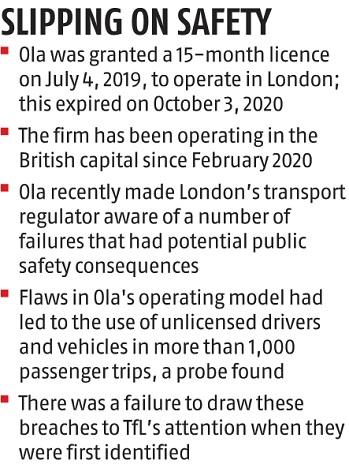TfL found that the car-booking service was not “fit and proper” to hold the private hire vehicle operator’s licence after discovering a number of “failures” that could have risked public safety.
The development comes days after Uber, Ola’s US rival, won a legal bid to restore its London operating licence, which had also been taken away over safety concerns.
“We can continue to operate until the decision of the appeal in court. So nothing changes for customers and drivers,” said a source in Ola. “It is important to note for riders, drivers, and TfL that all the issues have been corrected and we are confident we can demonstrate this in appeal.”
According to sources, in the course of this process, TfL has asked for further reassurances, primarily around the technical operation of its databases.
“Our duty as a regulator is to ensure passenger safety. Through our investigations we discovered that flaws in Ola’s operating model have led to the use of unlicensed drivers and vehicles in more than 1,000 passenger trips, which may have put passenger safety at risk,” said Helen Chapman, TfL’s director of licensing, regulation and charging. “If they do appeal, Ola can continue to operate and drivers can continue to undertake bookings on behalf of Ola. We will closely scrutinise the company to ensure passenger safety is not compromised,” Chapman added.

Ola has been operating in London since February 2020. It recently made TfL aware of a number of failures that had potential public safety consequences. These included historic breaches of the licensing regime that led to unlicensed drivers and vehicles undertaking more than 1,000 passenger trips on behalf of Ola. There was also a failure to draw these breaches to TfL’s attention immediately when they were first identified.
“At Ola, our core principle is to work closely, collaboratively, and transparently with regulators such as TfL. We have been working with TfL during the review period and have sought to provide assurances and address the issues raised in an open and transparent manner,” said Marc Rozendal, MD, Ola UK. “Ola will take the opportunity to appeal this decision and in doing so, our riders and drivers can rest assured that we will continue to operate as normal, providing safe and reliable mobility for London.”
TfL said applicants had a right to appeal against the decision to a magistrates’ court within 21 days. Ola can continue to operate pending the outcome of any appeal process.
TfL’s regulation of London’s taxi and private hire trades is designed to ensure passenger safety. Private hire operators must meet rigorous regulations and demonstrate to TfL that they do so, in order to operate. Before granting a licence, TfL must be satisfied that an operator is fit and proper to hold a private hire operator’s licence.
Ola was granted a 15-month licence on July 4, 2019, which expired on October 3, 2020. The Private Hire Vehicles (London) Act 1998 includes provision to appeal a licensing decision within 21 days of it being communicated to the applicant.
Ola is serving over 250 cities across India, Australia, New Zealand, and the UK. The firm launched its operations in the UK starting with Cardiff in August 2018. It had been steadily expanding across the country and was serving millions of users across Birmingham, Liverpool, Exeter, Reading, Bristol, Bath, Coventry, and Warwick.
Besides Uber, Ola competes with players such as Free Now and Bolt and traditional black cab drivers in the London market. Last year in November, Uber lost its licence to operate in London. TfL had said Uber would not be given a new licence in London after repeated safety failures. A key issue identified was that a change to Uber’s systems allowed unauthorised drivers to upload their photos to other Uber driver accounts. This allowed them to pick up passengers as though they were the booked driver, which occurred in at least 14,000 trips, putting passenger safety and security at risk.
To read the full story, Subscribe Now at just Rs 249 a month
Already a subscriber? Log in
Subscribe To BS Premium
₹249
Renews automatically
₹1699₹1999
Opt for auto renewal and save Rs. 300 Renews automatically
₹1999
What you get on BS Premium?
-
Unlock 30+ premium stories daily hand-picked by our editors, across devices on browser and app.
-
Pick your favourite companies, get a daily email with all news updates on them.
Full access to our intuitive epaper - clip, save, share articles from any device; newspaper archives from 2006.
Preferential invites to Business Standard events.
Curated newsletters on markets, personal finance, policy & politics, start-ups, technology, and more.
Need More Information - write to us at assist@bsmail.in



)